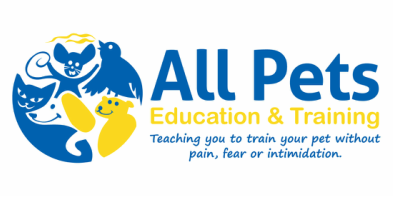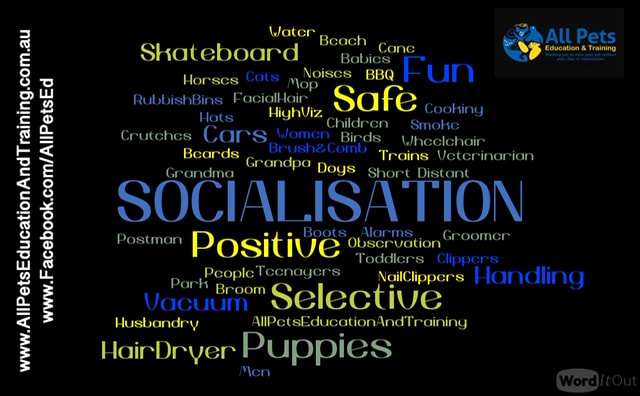30-day puppy socialisation challenge
Using rewards, choice and careful, select socialisation to set your puppy up to be the best he can be.
We all want the best for our puppies.
We want puppies that will be confident, optimistic, adaptable and social creatures when they become older.
To do this we must carefully socialise them.
This means that we pick and choose, who, what, where and when our puppies socialise.
However, there is a catch. To get the maximum benefit for your puppy, you should aim to have a solid grounding by the time your pup turns 12 weeks. The next catch – your pup will not be fully vaccinated before this time despite vaccines with an early finish, and depending on vaccination program/protocol this may not actually be completed before 18 weeks. Saying that, pups still learn after this period, but they aren't as naturally flexible.
So, what am I saying? Let’s get our pups out and about – safely. This means choosing well run puppy schools, taking your pup places that are safe (vaccinated dogs houses etc, other peoples places etc), or taking your pup out and about where they can see and smell the world from safety – this could be your arms, pram etc.
Dr Ian Dunbar reports that “Well socialised puppies grow up to be wonderful companions, whereas antisocial dogs are difficult, time-consuming, and potentially dangerous”. After You Get Your Puppy – Dr Ian Dunbar.
But it’s not just humans your pup needs to be comfortable with. Its new things, animals, sounds and smells.
So, I have set up a 30-day challenge for you. Take note each day jot down what your puppy saw, interacted with etc, how your puppy responded, and how many new people he meets and new dogs.
Remember when meeting new dogs, ensure your puppy is safe (vaccinated friendly dogs only, if safe environments). Also it is important to understand that he doesn’t have to play with them and they don’t have to play with him. Just seeing them, and having good things happen (small meaty rewards, tug game etc) is more than enough.
We actually don’t want to teach our pup that you can play with each and every dog – otherwise one day he will run across the wrong dog and likely lose his nose. Of course, select, well matched play mates are great!
Pamela Dennison says “During the socialisation process (and really during his entire life), it is imperative to make sure that he is around only friendly people and dogs. Sometimes, all it takes is one attack from a non-friendly dog to create a dog aggressive dog or one really bad experience with a person to create a human aggressive dog”.
Just yesterday, my own pup and I watched a tractor go by and then on the way back the gentleman stopped and came over to say hi. 2 things off my list in one go.
If at any time your puppy is fearful, wants to gain space etc, let him. It is as much about learning that they can also trust you not to force them in to things they are not comfortable with as it is building confidence. Listen to your puppy!
If he doesn’t want to participate, stop for the day, or break it down in to smaller achievable chunks. Use two people where possible, one to control whatever the pup may be meeting/watching etc, and the other to reward the puppy and be his advocate.
Be guided by how your puppy interacts and how he takes reinforcement. If he is usually gentle when taking rewards, and now you are feeling teeth and he is “grabby”, he is likely over aroused or stressed. Likewise, if your pup is usually keen on rewards and isn’t taking them, he is also likely stressed. Remove the stressor or increase his distance from the stressor until he is comfortable.
We want puppies that will be confident, optimistic, adaptable and social creatures when they become older.
To do this we must carefully socialise them.
This means that we pick and choose, who, what, where and when our puppies socialise.
However, there is a catch. To get the maximum benefit for your puppy, you should aim to have a solid grounding by the time your pup turns 12 weeks. The next catch – your pup will not be fully vaccinated before this time despite vaccines with an early finish, and depending on vaccination program/protocol this may not actually be completed before 18 weeks. Saying that, pups still learn after this period, but they aren't as naturally flexible.
So, what am I saying? Let’s get our pups out and about – safely. This means choosing well run puppy schools, taking your pup places that are safe (vaccinated dogs houses etc, other peoples places etc), or taking your pup out and about where they can see and smell the world from safety – this could be your arms, pram etc.
Dr Ian Dunbar reports that “Well socialised puppies grow up to be wonderful companions, whereas antisocial dogs are difficult, time-consuming, and potentially dangerous”. After You Get Your Puppy – Dr Ian Dunbar.
But it’s not just humans your pup needs to be comfortable with. Its new things, animals, sounds and smells.
So, I have set up a 30-day challenge for you. Take note each day jot down what your puppy saw, interacted with etc, how your puppy responded, and how many new people he meets and new dogs.
Remember when meeting new dogs, ensure your puppy is safe (vaccinated friendly dogs only, if safe environments). Also it is important to understand that he doesn’t have to play with them and they don’t have to play with him. Just seeing them, and having good things happen (small meaty rewards, tug game etc) is more than enough.
We actually don’t want to teach our pup that you can play with each and every dog – otherwise one day he will run across the wrong dog and likely lose his nose. Of course, select, well matched play mates are great!
Pamela Dennison says “During the socialisation process (and really during his entire life), it is imperative to make sure that he is around only friendly people and dogs. Sometimes, all it takes is one attack from a non-friendly dog to create a dog aggressive dog or one really bad experience with a person to create a human aggressive dog”.
Just yesterday, my own pup and I watched a tractor go by and then on the way back the gentleman stopped and came over to say hi. 2 things off my list in one go.
If at any time your puppy is fearful, wants to gain space etc, let him. It is as much about learning that they can also trust you not to force them in to things they are not comfortable with as it is building confidence. Listen to your puppy!
If he doesn’t want to participate, stop for the day, or break it down in to smaller achievable chunks. Use two people where possible, one to control whatever the pup may be meeting/watching etc, and the other to reward the puppy and be his advocate.
Be guided by how your puppy interacts and how he takes reinforcement. If he is usually gentle when taking rewards, and now you are feeling teeth and he is “grabby”, he is likely over aroused or stressed. Likewise, if your pup is usually keen on rewards and isn’t taking them, he is also likely stressed. Remove the stressor or increase his distance from the stressor until he is comfortable.
| 152._30_day_socialisation_challenge.pdf | |
| File Size: | 354 kb |
| File Type: | |
Absolute Dogs (n.d.). Puppy Power. [online] Absolute Dogs. Available at: https://absolutedog.s3.amazonaws.com/ebooks/Puppypower_v06.pdf.
Dennison, P. Articles: Early Doesn’t Mean Only by Pamela Dennison at Positive Motivation Dog Training!. [online] Positivedogs.com. Available at: http://www.positivedogs.com/articles/early_doesnt_mean.html
Dubar, I. (2001). After you get your puppy. Berkeley, Calif.: James & Kenneth Publishers.
Dennison, P. Articles: Early Doesn’t Mean Only by Pamela Dennison at Positive Motivation Dog Training!. [online] Positivedogs.com. Available at: http://www.positivedogs.com/articles/early_doesnt_mean.html
Dubar, I. (2001). After you get your puppy. Berkeley, Calif.: James & Kenneth Publishers.

